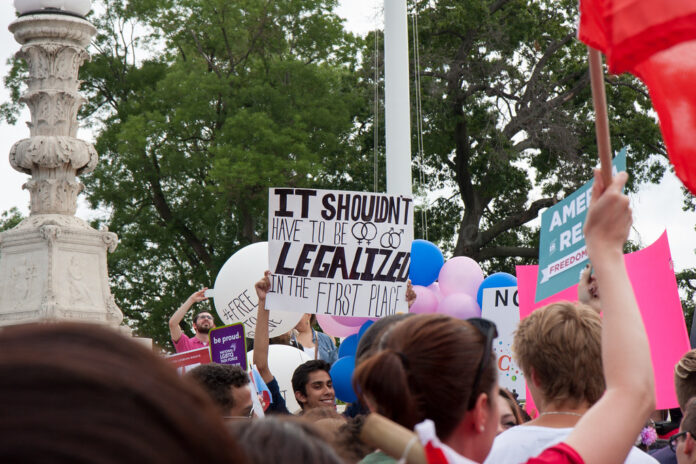Kendra Griessel ‘25 is a psychology major with an interest in LGBTQIA+ topics. They are currently working on an honors thesis about compulsory heterosexuality. When they are not working on their thesis, Kendra enjoys knitting and long walks in nature where she regularly considers becoming one with the moss. Contact them at kbgriessel@wm.edu.
The views expressed in the article are the author’s own.
In 2015, the U.S. Supreme Court case Obergefell v. Hodges gave same-sex couples the right to marry, but now several states are pushing for this decision to be overturned. Gay marriage rights could be taken away again, yet this is not the central problem we should be protesting. The real problem is the institution of marriage itself and the way that those outside of it are discriminated against.
Gay marriage rights fall into the domain of respectability politics. According to Margot Dazey, respectability politics is “the process by which privileged members of marginalized groups comply with dominant social norms to advance their group’s condition.” With roots in 20th century Black women’s movements, respectability politics are often realized as a contentious issue within marginalized groups: certain group members will advocate for conformity and respectability in order to refute negative stereotypes, but other group members counter this practice, arguing that conformity reinforces the systems of oppression.
The latter argument is analogous to points made by author bell hooks about feminism. hooks brings to light the flaws of so-called radical gender-equalizing reforms, and stresses that true feminism is “necessarily a struggle to eradicate the ideology of domination that permeates Western culture on various levels, as well as a commitment to reorganizing society so that the self-development of people can take precedence over imperialism, economic expansion, and material desires.” hooks calls for us to bring down the system itself rather than trying to achieve parity within hierarchies because such respectability politics retains the dominant oppressive structure. Moreover, the ability to participate in respectability politics is afforded only to those most privileged within a marginalized group while the multiply marginalized may never be seen as respectable and are continually excluded from any reform within an existing oppressive structure. The institution of marriage is an example of one such oppressive socio-cultural structure and rather than trying to gain equal rights for upward mobility within it, we should be tearing down the hierarchically oppressive system as a whole.
“Oh, but what’s so wrong about marriage and how is it an oppressive system?” For starters, the cultural phenomenon of marriage is not what I am objecting to here — that is a whole other ball game — but rather the institution of marriage, the state-enforced system of privileges and discrimination defining marriage as a legal phenomenon. The institution of marriage privileges those within it and discriminates against those who are not. Being legally married invites tax breaks, insurance discounts and other state benefits. Most of all, marriage grants a sense of respectability to those who abide in it. Lori Jo Marso argues that “having the state accord legitimacy to some kinds of intimate relationships and consensual sex, but not others, goes against basic ideas of feminist freedom” and “the state should not also be linking our benefits and rights as citizens to our sexual and intimate choices.” Those who are single, divorced or cohabiting without marriage or polygamous/polyamorous are disadvantaged by the state and positioned as second-class citizens with fewer rights and opportunities. Marriage as an institution also discriminates against people with disabilities; some may be restricted from participating in the institution at all, costing them the upward mobility it affords, and others, who may rely on state or federal disability benefits, can only participate at the cost of their income.
“So, marriage is a problematic institution, but does Obergefell v. Hodges not still represent some amount of progress?” Well, while this Supreme Court case was progressive in the movement for equality in civil rights, equality in civil rights should not be the goal. Civil rights are the product of a system that normalizes the allocation of resources and respect according to the classification of some humans as deserving and others as not. But don’t all humans deserve basic respect and equality in the opportunity to attain resources? Granting marriage rights to same-sex couples further reinforces marriage as ideal, increasingly designating those who cannot participate or choose different paths as less respectable. With Obergefell v. Hodges possibly returning to the courts for reconsideration, it is understandable to feel a sense of mourning. After all, this push signifies a concerning shift in peoples’ attitudes toward the LGBTQ+ community, but it is important to remember that the civil equality we attained was through privilege and at the expense of those who remained oppressed.
Simultaneously, while I have discussed the privilege associated with being able to take part in the institution of marriage and the benefits and respectability bestowed by it, there is also privilege in being able to reject the institution. Some members of the queer community cannot afford not to take part in institutional marriage as they may rely on the tax breaks, insurance discounts and other state leniences that come with it to maintain their livelihood. In this way, the potential reconsideration of Obergefell v. Hodges is a great loss nevertheless. So, gay marriage rights are representative of a larger oppressive system of institutional marriage and the possible Supreme Court reconsideration would be a great loss but is ultimately not the main issue. “Where should we focus our protest efforts then?” I am so glad you asked. We should fight to dismantle the problematic system itself, to decouple state benefits and the conferral of respectability from institutional marriage! No one’s relationship status should be dictated by a need for resources and opportunities. Our right to healthcare, welfare, financial concessions, and estate planning should not be based on the choices we make about lifestyle or relationships. Everyone — single, divorced, monogamous, polygamous/polyamorous, cohabiting, disabled, etc. — should have the same rights and opportunities!

